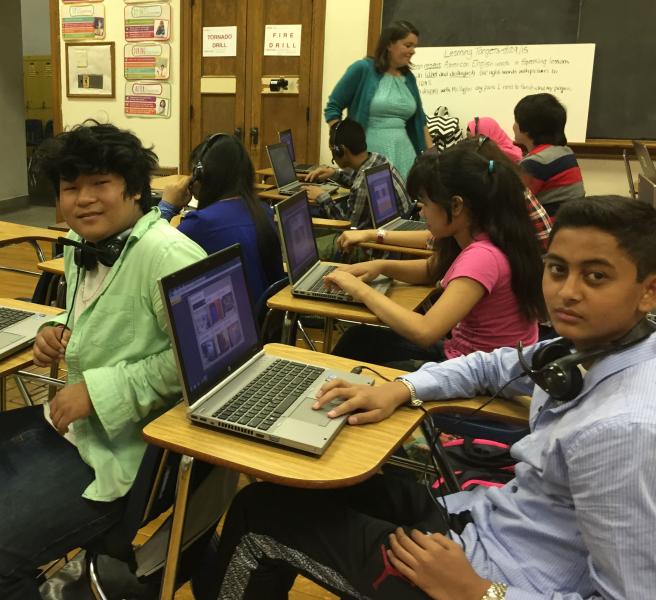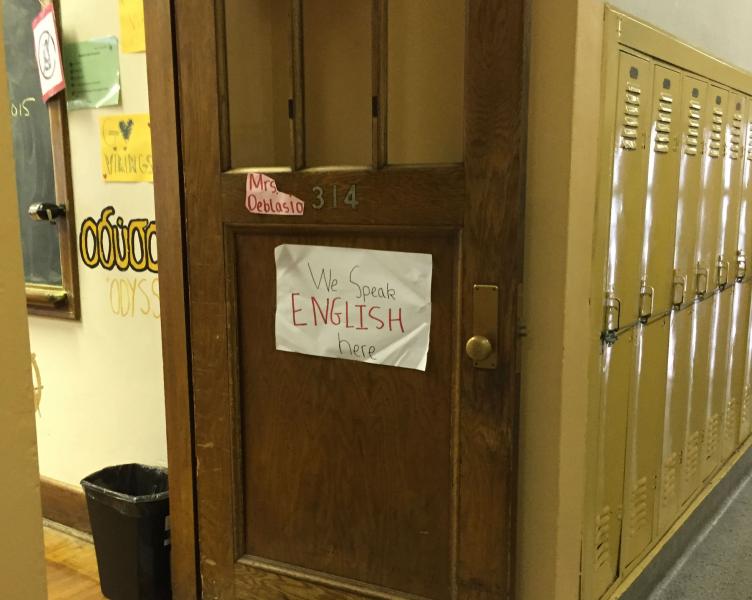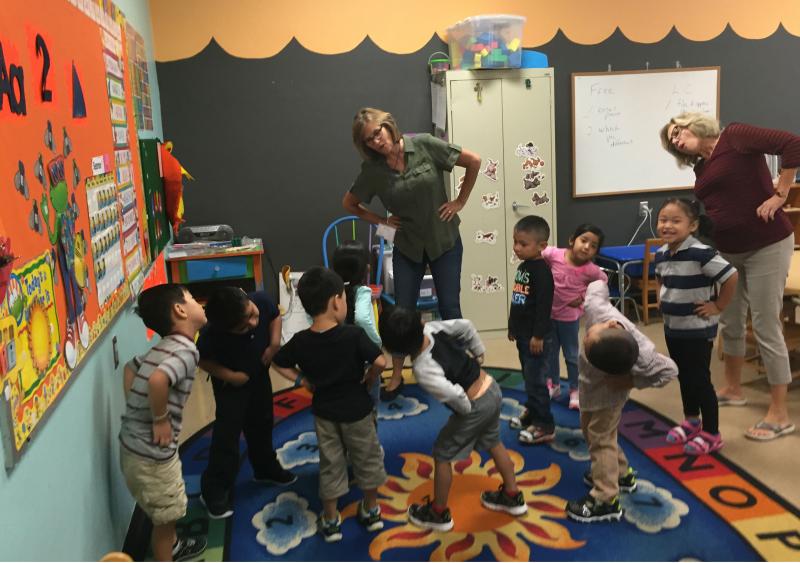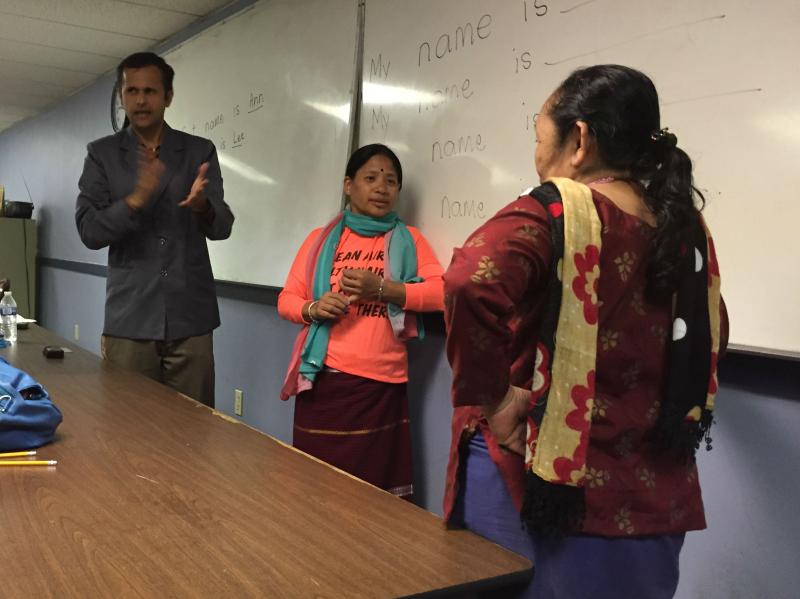When enrollment sank to about 600 students a few years ago, everybody expected North High School to close. Instead, its enrollment has grown to about 850, making it the third largest high school in Akron. And for more than half the students, English is a second language. For many, Nepali is a first. enrollment has grown to about 850, making it the third largest high school in Akron. And for more than half the students, English is a second language. For many, Nepali is a first.
North is now one of the most diverse schools in Ohio. Not only is enrollment up, but test scores took a bit of a bounce. The soccer team is renowned. On the other hand, the school report card is bad and the graduation rate makes Principal Rachel Tecca cringe.
“We have students now who are enrolling in high school who haven’t been in school for three or four years. Yet they still need to 1) earn all their credits and 2) pass the high stakes test.”
"We speak English here"
 Principal Rachel Tecca says North is also trying to come up with extracurriculars that connect kids to their school and to interests they bring here from across the world: Principal Rachel Tecca says North is also trying to come up with extracurriculars that connect kids to their school and to interests they bring here from across the world:
“For the 450 kids who are coming from different countries, cheer-leading is not a big deal to them. Basketball is not a big deal. So those traditional kind of American extracurriculars that everybody likes and is a part of, they have no interest in whatsoever.”
|
The third floor of North is where they try to make that happen. It’s dominated by English-as-a-second language classrooms. It has a squadron of interpreters for science, social studies, algebra.
But they do not translate in English class. That’s because even here – as signs announce on every door: “We speak English.”
Teacher Catherine Hughes say the reason is simple. The kids will eventually need to take tests in English and deal with life after high school – in English.
"Sometimes students can rely a little bit too much on interpreters. So it helps them to practice more to be able to spread their wings a little bit.”
Keep trying
Hughes is using a Rosetta Stone computer program. It’s focuses on conversational language. It's a pilot project that adds another 50 minutes to the 100 minutes a day in which the kids already are immersed in English. It's a pilot project that adds another 50 minutes to the 100 minutes a day in which the kids already are immersed in English.
One of those in Hughes' class is Deepan Biswa, who wants to be an engineer.
But there challenges. Until about two months ago, his school was in a U.N. refugee camps in southeast Nepal: a bamboo room with a dirt floor, a blackboard and a notebook. The last grade he completed was sixth.
Still, says Deepan: “Try best and don’t give up.”
The rules of high school
This is high school so, Principal Tecca says of course social relationships impact learning. She notes that people pick up English quicker when few around them speak their native language. At North, lots of people speak Nepali.
 Excerpt from the Class of 2012 North High School valedictory speech: Excerpt from the Class of 2012 North High School valedictory speech:
“In the refugee camp there was only today. I had no dreams for the future. What I have learned is that there can be a tomorrow. There can be a dream for the future.” |
Nilam Ghimirey is a child of the camps and valedictorian of North High School class of 2012. She remembers some of the dynamics.
“Even in high school I heard that if some Nepali kids tried to speak English, the other Nepali kids made fun of them. And then they don’t ever reach out and they are always isolated in their own groups.”
Thinking about the future
She is now an honors student at Kent State and plans to be a doctor. But she’s also founded a peer mentoring effort to get more Nepali kids to consider college.
“The kids never had a cell phone. Never had a television. No electricity, no running water. And here all of the sudden them come here, find job and have money with them and have a cell phone and car. And that’s what they see right now and they don’t see beyond it.”
There are other partners beyond Akron Public Schools in the education of North Hill's children.
By Christmas
Others, like the North Hill ministry group Urban Vision have stepped in. It runs a preschool in a church in North Hill. Few of the 4- and 5-year-olds in Dee Moore’s class understand English. Fewer speak it.
She says the parents are pretty explicit when they fill out their goal sheets for their children. 1) Learn English 2) Learn.
And she says they will.
“Usually by Christmas, they’ll be chattering to each other in English.” But for now, “It’s a lot of charades at the beginning, and then we do a lot of repeating and then we do little flannel boards. Over there, the mouse is on the red house, or the mouse is behind or above or below...”
Never too late
At the other end of the spectrum is Mahananda Luitel’s English as a Second Language class in the basement of the International Institute of Akron. His class is filled with older students, and he acknowledges many have a harder time learning English. But he says it’s crucial to try: He and others are increasingly concerned about isolation and a sense of displacement among older people in the community – something that has spiked the suicide rate. Learning English can battle that, Institute of Akron. His class is filled with older students, and he acknowledges many have a harder time learning English. But he says it’s crucial to try: He and others are increasingly concerned about isolation and a sense of displacement among older people in the community – something that has spiked the suicide rate. Learning English can battle that,
“It is becoming more friendly. It is becoming a home-like situation gradually. So really, their psychological aspect is changing through the language.”
North High School Principal Tecca says – despite the challenges at all levels – changing outlooks is a responsibility that crosses generations and cultures in North Hill.
She says the only question that matters is: “Are we showing growth and are we helping kids reach their goals and dreams?” |